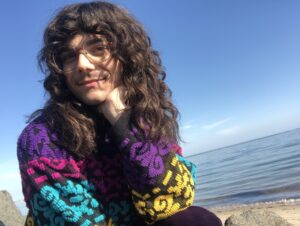Reading Tyler Raso’s poetry feels like walking down an aisle in Spencer’s, the mall outlet store that peaked in the aughts and was famed for its hot pink sex toys and stuffed Pikachus. “If Spencer’s had a poet-in-residence, I would want to be it,” the Fine Arts Work Center fellow says.

Raso’s poetry evokes Spencer’s not because it is raunchy or passé. The poems contrast cartoon characters and internet fads with the onslaught of adulthood and sexuality. Raso sorts through the stuff of their childhood in the late 2000s, repurposing Omegle chats and first-person shooter video games to understand their early experiments with identity, particularly how they expressed gender online while unmonitored at the family computer.
“I was 11,” says Raso. “I was like, ‘I’m not a boy.’ I couldn’t describe this in enough language to convince the people around me, but I knew it deep down, and I was going on message boards, casually calling myself a woman. I’m catfishing by definition, but I’m not doing anything with it. I’m not trying to get anyone’s information or fall in love with anyone.”
Raso’s early experiments with “catfishing” — using a fake identity to gain someone’s trust — taught them how language can be used to create new kinds of truths. Like those message-board interactions, the poems tell stories that describe an intuitive yet invisible reality. Language might be unreliable and up to the discretion of the author — a poem can tell many lies, Raso says — but those lies can touch on things that are undeniably true.
Raso arrived at FAWC as one of this year’s writing fellows with a manuscript including poems with titles like “When prayer didn’t away the gay, my dad taught me how to play DOOM on the family computer [Golden Shovel]” and “Self-portrait as that one scene from Pokémon: The First Movie.” They spent the first few months rearranging the poems, and also reading, sitting on the beach for an hour every day, and playing Animal Crossing.
Raso will read poems from the manuscript, tentatively titled “Mirror Would Be a Beautiful Name for a Child,” on Friday, March 23 at FAWC in a group showcase with visual arts fellows Miguel Braceli and LaRissa Rogers and writing fellow Adeniyi Ademoroti.
Before arriving in Provincetown, Raso, a graduate of Kenyon College, finished an M.F.A. in poetry at Indiana University Bloomington.
During those daily hours at the beach, Raso writes. Over the last six months, fragmented prose filled pages — more fluid and less constrained by the strictures of poetry than their previous work. At first, they looked at the writing and thought, “This is nothing.”
Then, slowly, Raso began to see the themes that will culminate in a book-length prose poem. They attribute that change in part to a recent choice to begin hormone replacement therapy.
“Being more expansive about how I and my body relate to the larger question of gender has been very transformative for my work because it brought me to a place where I didn’t feel the need to have a defined answer or solution,” Raso says. “I was more comfortable just exploring feeling.”
Poetry’s conventions tell the writer to “end on the articles, or on the punctuation, or on a unit of breath,” Raso says. Those rules try to follow the rhythm of the body as it speaks the poem aloud, striving to anticipate when the reader will want to catch their breath or carry on to the next line. But Raso wants readers’ bodies to follow the rhythm of the poems instead.
“If you expect to be able to breathe, I’m not going to let you breathe, or you’re going to have to breathe at the wrong place,” Raso says. “I want you to have a moment where you notice that there’s a music, but it doesn’t line up with the music you’ve been taught.” There, Raso sees a parallel to gender experimentation “or failing to perform the body that you’re assigned.”
Raso’s poetry happens with the body, to the body, and through the body. A reader might stutter or gasp while reading Raso’s work, unable to catch the cadence of the verse. The discomfort adds a layer of meaning, a hint of how it feels to be in a body that does not behave.
One poem from Raso’s manuscript, titled “[fig. 312 decoy] [fig. 313 decoy with wings],” recalls a scene of schoolyard brutality. It asks, “Who has harmed me?/ Who has opened me?/ Who has authored me?” Was it that boy on the playground in the very moment that he hit Raso and made a sound like “a tangerine being split open”?
Or if the reader’s breath and body falter alongside Raso’s, the poem might be asking: What is happening to me right now as you read this? Who makes the poem and who breaks it?
